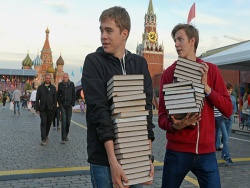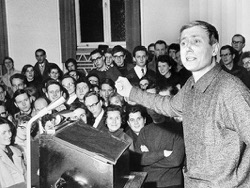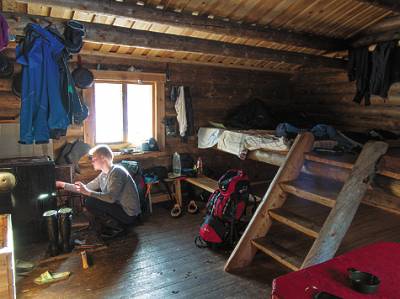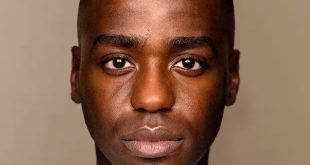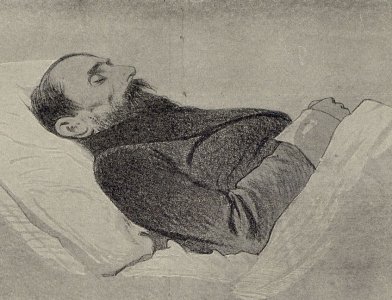
For the last few centuries, little has changed in the lives of creative people, writers, poets. Equally hard to become heard. Also cumbersome to break up into unreachable heavens of honor and success. Why have the wary-concentration area on the cutting edge of public life, in the midst of the critical-publicistic layers. At the height of modern knowledge to the same. To your hudojestvenniy nerve sounded in unison narrow-minded hopes, feelings, and bright aspirations-dreams. Bitter unpleasant truth.
It is a major poet. And I don’t understand how it forget.
It should not be forgotten.
Tolstoy
In the blue sky over fields
Clouds with Golden edges…
Nikitin
Even harder to be, in Bunin, just a “good person.” With a responsive soul and hot feeling instinctively the rushing of “the depths of the heart.” Because to graphic to depict living people, to make the audience see and feel the smells of nature and the movement of “the best strings”, you have to be very spiritually strong and hot. In some sense inflexible. Solid.
It must be firmly linked to “his soil”, earth – millions of natural fibres. And from these divine threads-gifts, physical and Platonic, to be a fortress, an Outpost of the progressive art and literary thought. Despite the horror of domestic turmoil. Slowly and gradually killing you. Burning flesh.
This is the peasant poet Ivan Nikitin. So, it is extremely tragic, but unprecedented intense spiritual growth, was his short life: 37 years of Pushkin (1824 – 1861).
*
“Bursa has ismozilla damn my willpower and taught me to drink,” complained a graduate of the Alexander Nevsky Seminary N. Pomyalovsky in a letter to the classmate N. Annunciation.
Pomyalovsky, carved in the time learning as much as four times for violation of the orders of lords there, called Bursa superior “acoustically institution”. Which, in his opinion, was worse than the horrors of prison Dostoyevsky of “the house of the Dead”.
Oh, I’m familiar with this school!
It does not see the change:
The W science – the skeleton bare,
Smells of incense from the walls…
Nikitin
Moreover, if “the dead house” with the whole documentary katorzhanskaya the philosophy and integrity of the characters, it is prone to the apophatic knowledge of self-improvement. In Bursa similar tendencies were not foreseen in sight. Spiritual institution and its tyranny, ignorance and poverty “is one of very many, though of the most innocent events of our widespread and comprehensive poverty and misery,” – said Dmitry Pisarev.
Meanwhile, strange or not, the Institute of the Seminary was presented to the society some miraculous phenomenon that issued from cautious squalid walls of one of the most powerful seminarians cohort of outstanding figures of Russian science and culture.
Philosophers: N. G. Chernyshevsky, V. D. Kudryavtsev-Platonov, S. N. Bulgakov, S. S. Gogotsky.
Historians: V. O. Klyuchevsky, E. E. Golubinsky, N. F. Kapterev.
Writers, critics, linguists: N. A. Dobrolyubov, M. A. A., I. S. Nikitin.
Scientists, teachers: P. F. Kapterev, S. I. Miropolsky.
Also the first winner of the Nobel prize to I. P. Pavlov. Surgeon N. Burdenko. Artist V. Vasnetsov. Physicist-inventor A. S. Popov and many others. other.
V. Rozanov spoke about this: “..meanwhile, the seminarians only, and are receptive to the subtleties of philological culture, and can cope with its difficulties. (…) The clergy even in the poor households are predominantly cultural: it is after him for ten generations, which for better or worse, but studied, been wracking my brain, something was learned, what not to do neither the ancestors of the journalist, or the ancestors of the peasant or merchant”.
Ivan Savvich Nikitin, along and across the studied prison regime of the Seminary during the course and had to it is clearly hostile biases – however, quite understandable “absence from” to classes, rudeness and drunkenness, – fully described the theological school in the famous “Diary”. Caught most valuable source of information about the era of the 40s of the 19th century – albeit artistically done. Along with a strictly documentary reports stored in academic archives.
Know – Dolby, like a woodpecker, safely…
Sorry, the job is not easy:
Hammering, hammering, finish the job –
The fruit is a worm.
Despite some obvious exaggeration of student hardships, similar to the peculiarities of English public schools, his first poem of I. S. Nikitin wrote in the Voronezh Seminary. There are deeply imbued with the spirit of respect and love for the printed word and writing had a literary circle. Played guitar, harp, possessing a natural sense of rhythm.
There came to him a dream of his own large library, where it will be Pushkin, Gogol, Goethe and Schiller in the original, the best French poets and prose writers. And Spartan living conditions, and physical punishment is right, where do without them – was raised in the disciples is nothing like fortitude and self-control, ability and desire to work hard.
Handwritten extracurricular, and appointed to the same journals and diaries diligently scribbled and led many. What guys wiggled the value priority developed a thorough judgment and analysis capabilities. To it pushed, pushed by the desire of teachers to form thinking ability of students through a variety of knowledge, and “through the independent work of mind over abstract questions of theological and philosophical nature” (P. Nicholas).
“Once a student did the division before and confused that I could not solve the problem. Is the poor girl at the blackboard, his face flushed, tears stream down my cheeks, nose stained with chalk, hands and right floor coat is also in the Cretaceous. Alex Stepanovich is angry, God forbid! “Well, it says that’s you!.., decide!..”. And suddenly he turned to the right. “Virgin! how do you think?” Virgin jumped up from the bench, stretched out his hands at his sides and remembering that the catechism is a similar question with a proper answer to it, publicly and drawlingly replied: “I think and talk about it as commands our mother the Church.” We all looked at each other, but are to laugh no one dared. Alexey Stepanovich spat in his eyes and shouted: “On your knees!”” (“Diary of a seminarian”).
Indeed, to get “in world” is needed, useful book with necessary material was very problematic. The more the folio is “meaningful” system. Like apologetics of Motard or “final causes” Nawila; researches of Tischendorf or “life of Jesus” Renard. Not to mention the specialized subjects: homiletics on the Holy Scriptures, sacred hermeneutics, geometry, and Paschal, etc.
The Seminary library in this regard had true wealth, the wealth of knowledge. Thus, in b-ke Voronezh theological Seminary in the 18th century there were over five thousand names. In qualitative terms it was more than a model: “…a seminarian of the old time spared neither time nor labor to the acquisition of literary works” (P. Nicholas).
For family reasons leaving Seminary with considerable, in General, the acquisition of intellectual baggage – Nikitin becomes convoluted and terribly ungrateful poetic way. Trying at least one eye, with the edge, to look into “the Kingdom of Shakespeare.”
Despite the “dismal percentage” of estestv. who had a thirst for literature: “Not to read – for me it means not to live.” Will the crippled destinies for many years as a “janitor with a head to toe”. Tempered with the Spartan life of the Seminary – with its antithesis of “live” and “dead”:
Loose soil ready
Sow until spring:
Good deeds and words
Not lost the seeds.
Where we are and how we got them –
Grandchildren report will give…
Dead to the world rested,
The thing came alive…
…he withdrew, went into a blind hopelessness from disappointing conclusions regarding modest, “sad” destiny: “See I was wrong in my chosen path.” Or, “I never folded, I could not lay down any light-hearted, fun song in my whole life!”. And then: “who cares about my sadness? All of his suffering!” – Sometimes thinking about suicide.
Especially in light of the anguish and unbearable mental agony to intolerable drunkenness of the father. Physically and mentally sick because of the frenzied oppression of poverty. But to quit could not. Not good it is bad job – sign dad, the way unlucky, evil, death sentence.
In the future, the concept of Holiness, good deeds pervades throughout his short creative biography. Exposing hunters to talk about abstractly, tearing the mask from Joe blow-mongers, the liberals-Chrysostom: “Be you cursed, idle word!”. Or, at the hearing: “No, you buffoon, not the singer…”. Original implementing agitated voice at the digression-orchestration of the works, making them rightfully the best, exquisite places of the text.
At the same time is simply suffering financially: “it is Known to all and Sundry that had been begged compassion, as a moral charity, heavier the grace of the ordinary” (from a letter to Countess A. Tolstaya). According to Nekrasov, Nekrasov on the same wave length when comparing his own sad Muse flogged with rods of the unfortunate peasant girl.
However, the vision beyond the image of the exceptional burdens of serfdom, lighting his sad prose philosophical life saving light images are phenomena of the truth. Turning subsequently part of Russian national heritage.
“Pure” literary work as a business started late, at 35 years of age. Opening a small book store with free library and Catalina. About which dreamed in Bursa: “I take the book trade, not the types of private speculation. I have another, more noble goal: familiarity of the public with the best works of Russian and French literature, in particular the introduction of the youth…” (from the Epistle to Maecenas V. Kokorev).
Leaving behind a decade of writing, fit, which incorporates the small, but high-capacity saturation artistic heritage. As if following the basic principle of a Seminary of science in the times of growing up and maturity: “a Little, but a lot!” “Non multa sed multum”.
Although really “clean” the Nikitin case is not just offered to friends and mentors, the progressive members in the N. Second, De-Pool, “radical” Pridorogin, as at the time Belinsky was offered to the poet-A. Koltsov Voronezh: – to throw Commerce to take off in Peter. Where wave the banner of democratic portents: where breathes the air of freedom “slums and forests”. But no… will not go away. Anyway and responsibilities, “bereisa neck,” family, community. Sad, dirty. But a necessary one.
*
From the first official publication of the poem “Russia” (1853) – “Diary of a seminarian” (1860), two books of poetry and a picaresque poem “the Fist” – was held to have broken through provincial complexes people, nervous energy which, soulful and inspired by the sky, instead of strong condemnation of the century – and travelling art sorrow for the drama of the people, “the shelter of discord”:
…Gloomy your view as the grave,
As the place of execution, where there is
With an iron chain post shameful
And the chopping block with the axe is laid!
It was blamed for suspended “philistinism”.
…And it was torn up.
Realizing that, lost in the descriptiveness sermyaga life can and does lose out output. Salvation, he saw in securing it realism and citizenship in art. Following the enduring precepts of the teacher, the inspirer of the poet-countryman A. Koltsov. Boldly making fun of the aesthetic niceties of the owners and a bar. Taking over from his bravado and wide, as a wild river don, the song harmony words. Borrowing immense, like a Russian mother, the subject of a legend about the great Russian hero: “Better train a soldier for the Tsar’s law, for the world is baptized lay your head!..” – praises Koltsov original patologica people’s heart. – “…Prowess will fly Yes I will embrace – and become happy and young!” – a quarter of a century echoes Nikitin.
“I tried to be Mr. reviewer go deep in the mud for the very road on which there is the author-tradesman. I would listen then, as he sang the dirt”, – Nikitin gives back the most Dobrolubovo! – be cautious reliablemy in his poems folksy story of a man who reflected on their suffering and try to tell them “decent tone and good style”. (Nikitin and criticized Nekrasov for abstract “elegiac complaints.” The first book, heritance, severely chastised Chernyshevsky.)
However, Nikitin then honestly admits to the inevitability of original imitation: and tutcheva Lermontov, Koltsov and maykovo. Profusely and even mocks him. Contrasting further Koltsov boil destinies completely smooth, harmonious, floating in boundless heaven, by low – lying mountain and debauchery Inns, short-circuited with the eternal necessity, in chains of worries and debts. Thus rejecting the conventions of literary etiquette, standing on a solid path of creating the truth and only the truth. Confidently and loudly knocking at a peasant Nabat escalating popular protest. For what bothered the persecution of the tsarist censorship. Adding to the ranks of “blagonamerenny”.
Former critics – and Dobrolyubov, Nekrasov – the least hesitation changed his tone, finding a new “solidity”. The Dollmaker mentioned it in the “Library for reading”. A celebrated writer, “the first puskinova” P. Pletnev found three remarkable features in the poetry Nikitin. With his inner – Bunin – “the chill truth”:
1) the sensibility of the soul, excites the mind to poetic activity;
2) an ear for music, enthralling harmony of the sounds of language;
3) a special memory to save combinations of ideas and images of what the abundant works of the best poets.
The realization and embodiment of a new poetics. Rebellious, gives hope, not a discharge “from a life point of view” – I would have added from the fourth item in this list: “…in the most hateful fact, to find a source of inspiration”.
What needs? This sad day I have lived
Under the weight of bitter experience.
But now it boils in me the excess force
And new feelings and thoughts…
Live Ivan Savvich remained, unfortunately, tragically little (died from serious illness on 16 October 1861).
He seemed to feel was in a hurry and rapidly catching up with the advanced Russian thought. Khodka, bystroletov grew as a person. Overcoming the prejudices and misconceptions in the form of nazidatelnostju and inspirational heroism Slavophile persuasion. Creative destiny far ahead of dolyushka household, vital, and earthy. Some of the poems giving the glory of a truly people – when the author’s name is immeasurably less well known than the work. Isn’t “nation”, not recognized?
At the same time without stopping the invisible fight with the everyday mundane of circumstances and hardships, drop by drop, eroding health: “Storms out of the family, whatever they were, still tolerable, but the roars of the storm and the storm is disgusting, dirty under the dear roof – impossible battle, because it is the ugliness in nature…”. – “Ivan Savic! Rascal so-and-so! – yelled at him half-crazed from drinking, irresponsible father. – Who gave you education and brought to the people? Huh? Do not feel? Dishonoring the father! Don’t feed it bread! Get out of my house!!!”
*
In General, the nature has not deprived Nikitin nor appearance, neither the loftiness nor the talent: “…he was of average height and, like his father, athletic, – reads the descriptions of contemporaries. – …Had a tanned, lean face, the best decoration of which had large black eyes, with those deep attractive eyes, which only occurs in gifted people”. – “No brothers or sisters Nikitin was not; he grew up alone. This separation from a very young age taught him to be alone, to reflect…” – says a close acquaintance of A. Nordshtein.
In the next “peasant” poets-fellow Koltsov predecessor and follower I. Surikov – it visually more educated, “cultured”. More built-in the Pantheon of the classics of Russian poetry. Therefore, the lyrics sounds special, powerful, high, hysterically. With national epic, imaginative scale. Echo executing best examples of the social genre. Filling our hearts with light and human empathy.
Motifs, scenes and events of the revolution West of the 48th year of the thirtieth anniversary “Nicholas Claus”, the defeat of the Petrashevsky circle, the Crimean war (“this Is your inheritance Russia, the Holy, the grandeur of blood to buy”); the liberation of the peasant struggle on the eve of the predatory reform; the flowering of “Bells”, “Contemporary” and updating “old man” – without the ecstatic recitations, soulful and sober time to reflect Nikitin for only 10-12 short of creative. (Plus a wonderful landscape lyrics of course.)
Deservedly regarded as the representative of the Nekrasovsky direction, “anarchists”, as they used to say Nikolai. Philosopher-humanist. However, “second row” – can be heard in certain statements. That does not detract from his “randomness” in the Russian language culture: “the Presence of the unfathomable power mysteriously hidden all over…”.
Shortly before his death, he will write, summing up his perfectionism and creativity, and hard life: “…to Understand, what a bright future awaits our posterity, what lies before us the broad road! I have a breathtakingly beautiful, when I think about it!..” – Read Goethe and Shakespeare in the original Russian, Voronezh poet Ivan Savich Nikitin responded to the descendants of the eternal moral “to Be or not to be?” definitely and firmly: “to Be”.
Sweat and blood have to pay us not only for each step, but for every inch forward.
Ivan Nikitin

